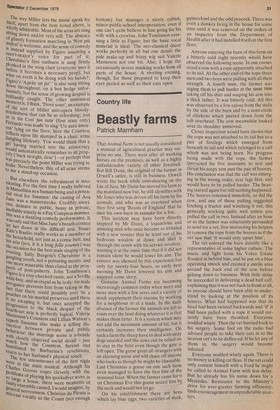Country life
Beastly farms
Patrick Marnham
ThatAnimal Farm is not usually considered a manual of agricultural practice may surprise no one. There were after all working horses on the premises, as well as a highly unfashionable variety of other livestock. But Bill Dunn, the original of the farmer in Orwell's satire, is still in business. Orwell wrote the book while convalescing, on the Isle of Jura. Mr Dunn has moved his farm to the mainland now but, he still identifies with Mr Jones who was driven off his farm by his animals, and who was so overtired when they first sang 'Beasts of England' that he shot his own barn in mistake for a fox.
This incident may have been directly inspired by Mr Dunn, a loquacious and amusing man who once became so irritated with a new rooster that he leant out of his bedroom window at dawn and shot it through the comb with his service revolver, warning it at the same time that if it did not remain silent he would lower his aim. The rooster was silenced by this experience but only for twenty-four hours, so early next morning Mr Dunn lowered his aim and enjoyed some sleep. Genuine Animal Farms are becoming increasingly common today when more and more men with a few acres and a variety of stock supplement their income by working for a neighbour or at a trade. In the daily absence of the farmer the animals are left to roam over the land doing whatever it is that makes them fatter. It is a system which may not add the maximum amount of fat, but it certainly increases their intelligence. On such a farm the sheep have to deal with stray dogs unaided and the cows can be relied on to stay in the field even though the gate is left open. The geese greet all strangers with an alarming noise and will chase off anyone who looks as though he might be chaseable. Last Christmas a goose on one such farm even managed to have the first bite of the seasonal feast. When the farmer came for it on Christmas Eve this goose seized him by the neck and would not let go. On his establishment there are hens which lay blue eggs, two varieties of duck, guinea fowl and the odd peacock. There was even a donkey living in the house for some time until it was removed on the orders of an inspector from the Department of Health after it had installed itself on the first floor.
Anyone entering the barn of this farm on a bitterly cold night recently would have observed the following scene. In one corner stood a cow with a rope apparently attached to its tail. At the other end of the rope three men and two boys were pulling with all their strength. A fourth man, the farmer was urging them to pull harder at the same time taking off his shirt and soaping his arm into a thick lather. It was bitterly cold. All this was observed by a few calves from the stalls by the side of the barn and by a semi-circle of chickens which peered down from the loft overhead. The cow meanwhile looked over its shoulder unmoved.
Closer inspection would have shown that the rope was not attached to its tail but to a pair of forelegs which emerged from beneath its tail and which belonged to a calf which was not being born. No progress being made with the rope, the farmer instructed his five assistants to rest and thrust his soapy arm past the pair of hooves.
His conclusion was that the calf was emerg ing in the wrong order, rear legs first, and would have to be pulled harder. The heav ing started again but still nothing happened. The hooves remained immobile, so did the cow, and one of those pulling suggested fetching a tractor and winching it out, this generally working quite well unless you pulled the calf in two. Instead after an hour or so the farmer was reluctantly persuaded to send for a vet, first instructing his helpers to remove the rope from the hooves as if the vet saw that 'it would only upset him'.
The vet entered the barn daintily like a representative of some higher culture. The music and light from his Volvo Estate flooded in behind him, and he put on a blue operating smock and created a sterile area around the back end of the cow before getting down to business. With little delay he succeeded in delivering a dead bull calf, explaining that it was not back to front at all, as anyone should have been able to understand by looking at the position of its hooves. What had happened was that its head had been twisted backwards and 'if' it had been pulled with a rope it would certainly have been throttled. Everyone nodded wisely. Then the vet hurried back to his surgery. Some fool on the radio had advised people to take their cats in to the nearest vet's to be deflea-ed. If he let any of them in, the surgery would become infested.
Everyone nodded wisely again. There is no money in killing cat fleas. If the vet could only content himself with a Ford he might be called to Animal Farm with less delay. But he already has his name down for a Mercedes, Resistance to the Ministry's drive for ever-greater farming efficiency, finds encouragement in unpredictable quarters.






































 Previous page
Previous page